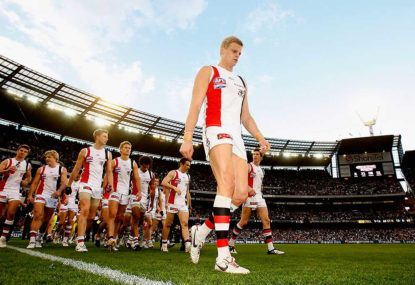Grand final day is the climax of the season. The ultimate game, four quarters are played and then the winner is crowned.
But what should be done in the unlikely event of a draw?
In a comparatively high-scoring game like Australian football, it’s not something that’s going to happen often. Only three times ever: in 1948, 1977 and 2010, have the scores been level when the final siren sounds.
But what should be done when it happens?
For those who support a team that’s playing in footy’s big day; there’s the angst-ridden process of getting hold of the scarce and expensive tickets.
For fans outside Victoria, there’s the stress and added expense of flights and accommodation to get to Melbourne for the big game. For everyone, there’s the thrills and spills of the day, the acknowledgement of the champions.
Win or lose, this is the end of the season. For the players, there’s the certainty of no more training for the season. For the fans, there’s a summer to look forward to.
As a grand final comes to an end, there is the emotion of agony and ecstacy in close proximity, as the winners take the spoils in scenes of pure jubilation while the losers are left with the empty feeling of contemplating what might have been.
But all that can be thrown into chaos if there isn’t a winner after four quarters.
We all remember the aftermath of 2010. When the shock set in that there was no winner, no loser and the season wasn’t over.
Collingwood captain Nick Maxwell took the Channel Seven microphone, calling it an “absolute joke” as the realisation set in that he’d have to go to training for another week and play again next weekend. St Kilda’s Nick Riewoldt expressed similar sentiments.
And for the fans, it was time to line up and fork out another lot of hundreds of dollars for another ticket. A nice money-spinner for the AFL, but an unexpected financial imposition for the supporters.
Thankfully it was a clash between two Victorian sides. Supporters from interstate would have had to come up with the money for another round of flights and accommodation.
West Coast and Sydney fans must have felt they dodged a financial bullet in 2006, when just one point separated the two non-Victorian teams in that year’s decider.
There were calls to change the rules, to allow for extra time rather than coming back next week for a replay. But the rules weren’t changed.
Six years later, the call has come out again. The AFL is looking again at the issue, with the Players Association leading the calls for change.
Is it time to change the rules?
Having a replay may be a rarely-invoked tradition. But tradition changes.
Other finals when drawn were once replayed; but that was changed after 1990. But the grand final remains subject to the old rule of a replay.
Inevitably the grand final will become a night game, played with a yellow ball, at some stage in the next few years.
The route of the grand final parade has changed. Rules of the game are routinely changed. New teams have come in. It’s no longer a purely Victorian league.
Tradition changes. If tradition is sacrosanct, there are bigger changes that happen every year than a rule that has been invoked three times ever.
And it’s no longer a purely Victorian league. For the league, for the clubs, and especially for the fans, last-minute interstate travel and accommodation is expensive. What may have been of little impact in the days of a suburban competition are major imposts for a national league.
Grand finals are always played in Melbourne, and that won’t change in our lifetime. It’s an advantage to the Victorian clubs over the interstaters. But for the non-Victorian club to have to travel again the next week while the Victorian club again has home-club advantage, is an unfairness.
For the players, an extra week of training and an extra game is a greater impact than in the old days when traditions were started. The risk of injury is sustained, and managing injury-prone players becomes more problematic with the addition of an unexpected game.
And for grand final day, we want a winner and a loser. To experience the highs and the lows, rather than the anti-climactic feeling that comes with an un-won premiership.
A grand final draw is unlikely. But if it happens, the old rules of a bygone era of a single-city suburban league have outlived their usefulness and are now an anachronism.
Play extra time. Give us a winner. Give us a loser. Give us a finale to remember.
One day in September/October, not two.





























































































